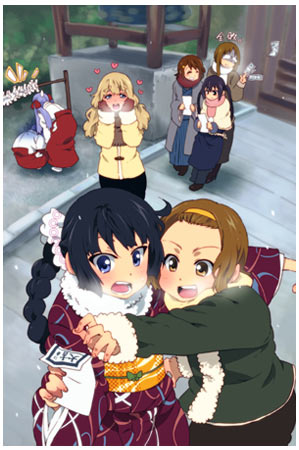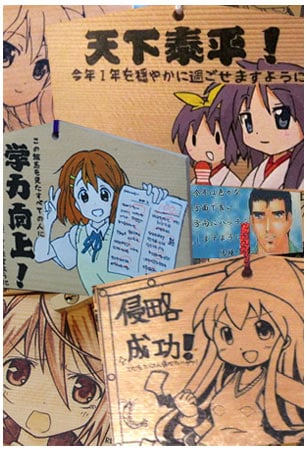Happy New Year, or as Japanese young people say these days, ake-ome! which is short for akemashite omedetou gozaimasu or “congratulations on opening the new year.” We hope that 2012 is a peaceful and happy one for you and all your loved ones.
As usual, we had a nice quiet holiday here in Japan, watching the New Year’s marathon on TV (by a strange coincidence it runs right through our city) as we looked through the nengajo New Year’s Greeting cards we received. Sending New Year’s Cards is a fun tradition that helps keep open certain connections that would disappear otherwise. Nengajo are sent in late December and delivered by the post office on the morning of January 1, and it’s always fun to see how many you get. Not everyone can receive a nengajo card however: families that have had a death occur that year are officially in a state of mourning and can’t receive them, so you have to be careful who you send the cards to. I’ve been posting examples of moe–kei New Year’s Cards on Twitter and the J-List Facebook page if you want to check them out. Also, if you want to see the New Year’s Card we sent this year, it’s right here.
In addition to being a day for relaxing, January 1st is a day for aisatsu (greeting) of family members, traveling to their homes and spending an hour or two visiting while they ply us with beer as well as traditional New Year’s foods, including Tsumugi’s eyebrows (which are pickled radishes called takuwan). When I asked my kids (aged 16 and 15) if they wanted to go with us, I half-expected them to decline, since it’s normal for kids to prefer playing video games or watching YouTube to visiting with relatives. They cheerfully agreed to come, however, and I knew why: the Japanese tradition of toshi-dama (lit. “new year coin”), cash that other family members are obliged to give them. The amount of money at stake is quite large — $50 for high school students, $30 for junior high and $10 for elementary school kids, from each family — so the kids were all to happy to endure the banter of relatives they hardly know for a quick cash payout. I think it’s a great custom, since in addition to giving kids a reason to be extremely pleasant and social, it forms the basis for the Japanese love of saving money, as parents will usually make kids put half the money they receive in the bank.
Another good thing about New Year’s in Japan is the TV — the shows are extra interesting as TV stations compete against each other for ratings. One show I caught featured the comedy duo Downtown. (For some reason, nearly all Japanese comedy is built around pairs of manzai comedians who do boke and tsukkomi acts, translatable as simple-minded guy and abusive straight man). In the show, the two main comedians were put on a bus and told they could not laugh no matter what, then at each stop, various strange people got on the bus and performed comedy skits. If Downtown laughed, strange men would appear and beat them with rubber hoses. It was silly, but hard not to giggle after a few minutes of this. There are also plenty of special anime shows on TV around New Year’s, too, like shows that countdown the best anime of the past 20 years.

We hope 2012 is awesome for everyone.















